SHORT TAKE: An intense and powerful but still intimate experience of the historic Operation Dynamo rescue at Dunkirk of over 300,000 desperately trapped Allied soldiers by mostly civilian volunteers told from all three perspectives of land, air and sea.
LONG TAKE: We’re all the way back home and I’m sitting behind my computer but my heart is still pounding. Dunkirk is one of those films, along with the likes of Hacksaw Ridge, Saving Private Ryan, Schindler’s List and Lone Survivor which you owe to those who endured the experience to bear witness to what they endured.
I THINK I HAVE AVOIDED ALL SPOILERS – I’m only referencing things you could see in the trailer.
Dunkirk, lest you not know, was the "Miracle" of Operation Dynamo in which one-third of a million soldiers were rescued from advancing German forces from the sandy shores of the bombed out and abandoned seaside French town of the same name. The rescue took place primarily not by a military cavalry, nor by a charismatic leader or even by the Avengers, but by….civilians in over 700 private vessels including yachts, fishing boats, personnel ships, tugboats, hospital ships, fireboats, trawlers, lifeboats, pleasure craft, a paddle steamer, the River Mersey Ferry, and other small ships, the smallest of which was only 15 feet long, several of which have been preserved in museums and a dozen of which are actually used IN the movie! These unnamed intrepid incredibly courageous crews all made their way across the channel from Ramsgate, England to either bring their boys directly home or ferry them from the beaches to the destroyers waiting offshore. Many were simply weekend sailors, fishermen and other private citizens – including older men, boys and women – who responded to the call for help. All braved death to bring their own home. The tagline is quite accurate. When 400,000 men couldn’t get home, home came for them – literally.
Directed by Christopher Nolan (Dark Knight, Interstellar and Inception), this incredible 10 week episode is told in telescoped perspective, hopping back and forth in time to accommodate the fact that the three main dovetailing stories cover different spans of time.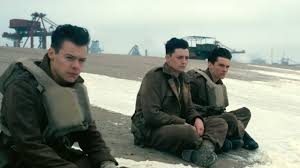 A week in the case of the soldiers stranded on the beach,
A week in the case of the soldiers stranded on the beach, a day for the sailors who came to pluck them away from death and
a day for the sailors who came to pluck them away from death and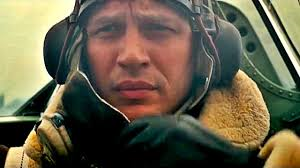 mere hours for the few air force able and allowed to provide air cover. As a result some events are told once and then retold from a different character’s perspective. It can be a little confusing but if you pay attention, as you should, this challenging POV is artfully and satisfyingly crafted by Nolan to tell the story with a depth you might not otherwise have been able to get.
mere hours for the few air force able and allowed to provide air cover. As a result some events are told once and then retold from a different character’s perspective. It can be a little confusing but if you pay attention, as you should, this challenging POV is artfully and satisfyingly crafted by Nolan to tell the story with a depth you might not otherwise have been able to get.
Some background is needed to understand the scope of desperation created by the situation. 400,000 men were surrounded, hopelessly outnumbered, gunned and flanked by the Germans. German planes straffed and bombed the helpless men on the beach. America was not yet in the war. Most of the Allied air force were either otherwise committed or held back in anticipation of the Battle over Britain to come. The destroyers were held back for the same reason. But without these men, England was done for as they made up the bulk of their army.
Although placed in harm’s way by a disastrous military defeat, the fortitude and courage required by these brave people to face imminent brutal death to rescue their own was testament to the British Spirit required to win the war and inspirational world wide. And even though they were only three-quarters successful these civvie sailors managed to multiply the most optimistic predictions of the Operation Dynamo organizers by TEN TIMES! Headquarters hoped to save 30-45,000. The British citizens rescued over 330,000.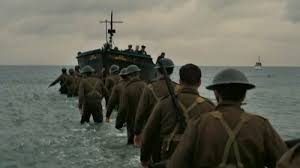
I do not believe any of the individual characters represent one individual person but each represent an amalgam of heroes. 
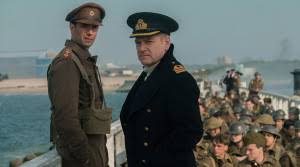 Kenneth Branagh puts his stamp on the military leadership who stayed behind to provide order to the soul destroying chaos as Commander Bolton.
Kenneth Branagh puts his stamp on the military leadership who stayed behind to provide order to the soul destroying chaos as Commander Bolton.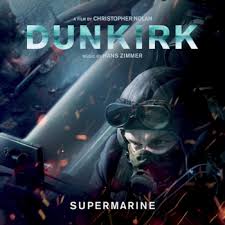 Tom Hardy (Inception and Dark Knights Rises) and Jack Lowden are air force Spitfire pilots who provide what protection they can against the German Stukas for the "Little Boats" and the men on the beach.
Tom Hardy (Inception and Dark Knights Rises) and Jack Lowden are air force Spitfire pilots who provide what protection they can against the German Stukas for the "Little Boats" and the men on the beach. 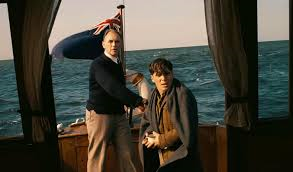 Mark Rylance (Bridge of Spies) as Mr. Dawson comes closest to portraying an individual – a thinly veiled Charles Lightoller, the second officer from the Titanic, who with his son and his friend insisted on taking his own ship across.
Mark Rylance (Bridge of Spies) as Mr. Dawson comes closest to portraying an individual – a thinly veiled Charles Lightoller, the second officer from the Titanic, who with his son and his friend insisted on taking his own ship across. 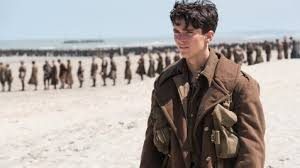 Much is seen through the eyes of Fionn Whitehead as Tommy, a young soldier cut off from his company, terrified and stranded, risking everything but his own conscience to get home.
Much is seen through the eyes of Fionn Whitehead as Tommy, a young soldier cut off from his company, terrified and stranded, risking everything but his own conscience to get home. 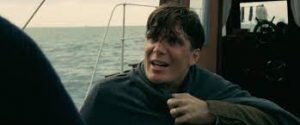 Cillian Murphy (Inception and Dark Knight) portrays a shell shocked young officer plucked from the sea by Dawson. Michael Caine does a voice cameo you have to have a quick ear to catch and there’s a point of film trivia which gives this a bit of poetic symmetry.
Cillian Murphy (Inception and Dark Knight) portrays a shell shocked young officer plucked from the sea by Dawson. Michael Caine does a voice cameo you have to have a quick ear to catch and there’s a point of film trivia which gives this a bit of poetic symmetry.
Although merely referenced in Atonement, the classic Mrs. Miniver, Their Finest (Hour and a Half), and The Snow Goose – the latter a very old Hallmark Show starring Richard Harris and based on a short story by Paul Gallico (Poseidon Adventure), the story of Dunkirk was only filmed once before. Appropriately enough it was called — Dunkirk. 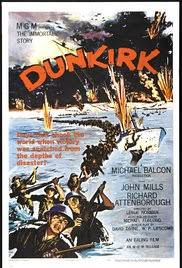 Made in 1958 it follows, on the Dunkirk end, much like Desperate Journey, a small group of soldiers
Made in 1958 it follows, on the Dunkirk end, much like Desperate Journey, a small group of soldiers 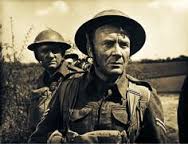
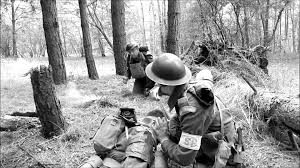
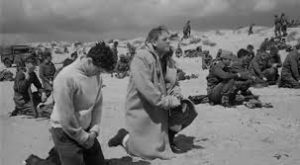
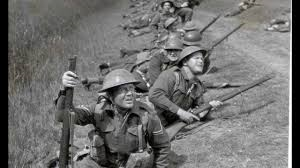 led by John (Swiss Family Robinson) Mill’s character Tubby, who trek from a mission to blow up a bridge to the shores of Dunkirk.
led by John (Swiss Family Robinson) Mill’s character Tubby, who trek from a mission to blow up a bridge to the shores of Dunkirk. 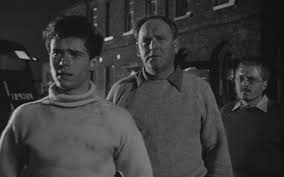
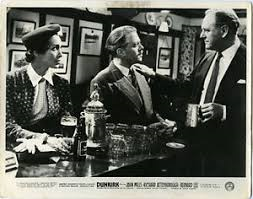 On the British end we root for two weekend civilian pleasure sailors portrayed by Bernard Lee and a very young THE Sir Lord Richard Attenborough (acted in Jurassic Park, Doctor Doolittle, Sand Pebbles, the Great Escape, and Branagh’s Hamlet, directed Chaplin, Magic, Gandhi, A Chorus Line, and Shadowlands, and a life long friend of the previously mentioned John Mills).
On the British end we root for two weekend civilian pleasure sailors portrayed by Bernard Lee and a very young THE Sir Lord Richard Attenborough (acted in Jurassic Park, Doctor Doolittle, Sand Pebbles, the Great Escape, and Branagh’s Hamlet, directed Chaplin, Magic, Gandhi, A Chorus Line, and Shadowlands, and a life long friend of the previously mentioned John Mills). 
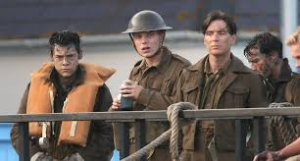 The 2017 Dunkirk cast includes none other than Sir Attenborough’s grandson, Will.
The 2017 Dunkirk cast includes none other than Sir Attenborough’s grandson, Will.
If I have only one gripe, it is that Nolan's personal take blunts the vastness of the Herculean effort that was required. At no time did I really get the sense of almost half a million men stranded on the beach or the hundreds and HUNDREDS of ships which answered the call to aid.  What Nolan has done is show a portion of it from the point of view of a few people. A few shots show a LOT of people but does not really convey the scope of almost a half million men trapped on a beach. I can't help thinking that even one aerial shots of beaches showing the enormity of the task and the sheer number of boats who came to their aid might have hit the right "awe-ness" aspect this event deserves, much like the railroad scene in Gone With the Wind where Scarlett walks through the sea of wounded.
What Nolan has done is show a portion of it from the point of view of a few people. A few shots show a LOT of people but does not really convey the scope of almost a half million men trapped on a beach. I can't help thinking that even one aerial shots of beaches showing the enormity of the task and the sheer number of boats who came to their aid might have hit the right "awe-ness" aspect this event deserves, much like the railroad scene in Gone With the Wind where Scarlett walks through the sea of wounded.
But that's enough of the quibbles. I have only mentioned the highlights of the movie’s virtues. There is much more to credit it in the visuals, the storytelling, and the performances.
This film is a hour and 45 minutes of unrelenting tension but goes by like a snap of the fingers as you are drawn into these historic events through these characters’ experiences. As one of the characters alludes – if they have done nothing else in their life but this they will have contributed much.
I’m as big a fan of comic book heroes as the next geek, but every generation should have real heroes to look up to like these men and women who risked their lives to pluck their own from the gates of Hell and bring them home. And Nolan does a beautiful job of giving homage to them all.


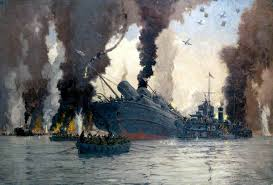

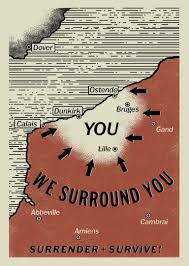


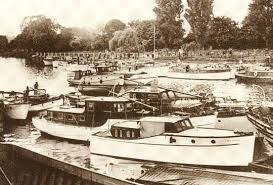
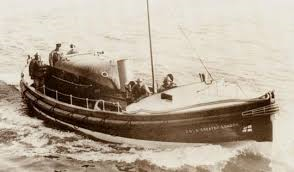
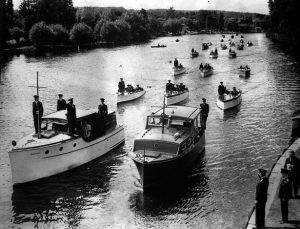
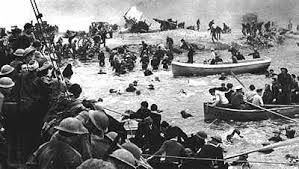
Kathy, I am not as big a fan of Dunkirk as you are – despite being British. But this is an excellent, accurate and very telling review. I have to say I missed Michael Caine's voice-over, and would love to know where that appeared.
But I share with you a sense that the vastness and numbers didn't show up in this film. As a glance at any documentary of Dunkirk will show you the beach was – apart from being full of troops – a vast military garbage dump of vehicles, equipment, cars, trucks. And the smoke from the burning buildings, stricken ships etc almost blackened the sky. When 'Tommy' first ran onto the beach it looked like like some placid sea-side resort. There was no sense of a shattering retreat as disastrous as Napoleon's retreat from Moscow.
I'm also puzzled that you say 'ten-week episode'…the evacuation took place over a period I think of about nine days maximum. Not even the disatrous campaign which started with the German blitzkrieg had lasted that long. I, like many Britons, was also puzzled by the screen explanations. It says on the screen something like, 'The enemy had pushed the French and British armies back to the beaches.' The 'enemy'? Why not just say the Germans? Or if this is too sensitive now Germany is our friend and ally, why not say 'the Nazis'? But 'the enemy'? This was mealy-mouthed political correctness gone insane.
But back to the review…it is a comprehensive, all-embracing and mostly accurate depiction of the movie, and of the event. With one exception; the men were NOT mostly rescued by the small boats. The majority were taken off from the 'mole' by Royal Navy destroyers. The civilian boat volunteers performed magnificently and played a vital part, but the real heroes were the Royal Naval seamen. One of the simple reasons for that is no Stuke dive bomber could easily hit a tiny boat bobbing in the sea – or would even bother – to kill what…14 men? But they could and did hit the destroyers and the larger vessels. So in truth it was the larger ships that ran the risk.
As a lad I watched the original Dunkirk with John Mills and I think that gives a better portrayal of what was happening. I would also say the opening scene where Tommy is fired on by the Germans, has no authenticity to it whatsoever. The streets of Dunkirk were in reality a flaming, smoking ruin. Instead he runs through pristine streets, and passes through French soldiers who look like they've just come off parade instead of exhausted, dirtied and bloodied men.
But one hopes this and its references gives lie once and for all that the French were 'cowards'. In six weeks they lost 100,000 men, and they carried on fighting for weeks after the British left. We know the British sent troops back but in reality they took almost no further part in the fighting.
To this day – I know because I have a home in France – the French bitterly resent accusations of cowardice. The brutal truth is that the Germans destroyed the French AND British armies, both of which were lacking in morale, equipment, tactics and leadership. And the Wehrmact would have destroyed ANY army of 1940.
But Dunkirk – yes it was a miracle, and the survival of our Army meant we had a fighting chance if invaded. I hope your generally excellent review will encourage to Americans to watch a movie about a part of World War Two that – understandably – they probably have little knowledge of. . But as Churchill said at the time, "Wars are not won by evacuations." It was a disaster turned into a miraculous escape.
When I was a boy my next-door neigjhbour, a man called Jack Aspinall, had been at Dunkirk, wading in water up to his chest. It ruined his health. He said of it, "It was a bloody shambles." But out of that shambles they performed a miracle.
Well done Kathy for bringing this film to the attention of your film-going public in the USA.
Stuart White